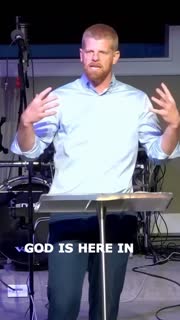Responding to the King: Faith Over Signs
Devotional
Sermon Summary
Bible Study Guide
Sermon Clips
### Quotes for Outreach
1. "The kingdom of God is here in a new way, and in this third book, there's a kind of an accent or an emphasis on responding. How do they respond to the news of this king? And so today, we're going to look at eight verses towards the end of Matthew chapter 12, and we are going to see the demand for more signs, the danger of ignoring, and the differentiation of Jesus." [31:47] (24 seconds)
2. "Jesus is showing them that he's the only true king with the only true kingdom. The person is better. Jesus is better than Solomon, but the whole thing is better. Jesus is better than Solomon, but the entire situation that Jesus is bringing is better. He's bringing a whole kingdom. That's what he has been preaching since he showed up on the scene. The kingdom of God is at hand." [39:17] (27 seconds)
3. "We are built to follow Jesus with everything we've got. To see him as king, and to trust him to call the shots. We are built for adventure with Jesus. To step out of this life, to step out in risk, to step out in curiosity, to step out into the unknown, to follow Jesus wherever he wants to lead us." [52:31] (23 seconds)
4. "The gospel tells me that I am worse than I think I am. That my sin is so bad, that somebody had to die for it. And not just anybody. The Son of God had to die for it. That's how the gospel starts. That's the gospel news, is that you got a problem. You're in trouble." [07:20] (21 seconds)
5. "The gospel tells me I'm worse than I think I am. It tells me I'm far more loved than I could have ever dared to hope. Listen, if you will let that pierce your soul, then it offers the resources to be both humble and confident at the very same time. And I think this is the road to being a non-anxious presence." [01:08:53] (19 seconds)
### Quotes for Members
1. "Jesus is saying that although this man had experienced an act of God, the removal of the evil spirit, he didn't respond to God at all. He didn't respond to God at all. God emptied out the house, and he cleaned it, but he didn't fill it with anything. Nothing like the repenting and the listening in Nineveh or the Ethiopian queen. He did not do anything truly spiritual." [45:18] (25 seconds)
2. "If you think the message of the gospel is turn over a new leaf, if you think the message of the gospel is just stop drinking so much, if you think that the message of the gospel is just get your relationships sorted out, if you think that's the gospel, you are actually in more danger than you were before." [49:42] (17 seconds)
3. "We have so many ways, and so many of our churches are guilty, of this. So many sermons that I have preached and others have preached have been guilty of this, where we have given you the impression that the goal here is for you to have a cleaned-up life, for you to have some sort of a moral life, and that is a false gospel. That is not the goal. That is not what Jesus is ultimately most fundamentally after." [54:10] (26 seconds)
4. "When's the last time you've taken a risk for Jesus? Even moderate ones, like committing to a spiritual practice for 30 days in a row. Just saying, I'm going to give 15 minutes to Jesus every day for the next 30 days. And like, keep your word. Committing to rhythms of worship with your church family on Sundays and in small groups in a way where that is unassailable, where it's just blacked out on your calendar." [01:00:09] (29 seconds)
5. "If you've given up your self-salvation projects, if you've actually transferred trust from yourself to Christ, so when your identity is rooted in the gospel, then you can engage the world without being captive to it. You can be present, but not so ingrained that you can't see it. You can actually have differentiation so that when these moments happen in your life, you can actually respond with peace, with wisdom." [01:11:51] (29 seconds)
Ask a question about this sermon
1. "The kingdom of God is here in a new way, and in this third book, there's a kind of an accent or an emphasis on responding. How do they respond to the news of this king? And so today, we're going to look at eight verses towards the end of Matthew chapter 12, and we are going to see the demand for more signs, the danger of ignoring, and the differentiation of Jesus." [31:47] (24 seconds)
2. "Jesus is showing them that he's the only true king with the only true kingdom. The person is better. Jesus is better than Solomon, but the whole thing is better. Jesus is better than Solomon, but the entire situation that Jesus is bringing is better. He's bringing a whole kingdom. That's what he has been preaching since he showed up on the scene. The kingdom of God is at hand." [39:17] (27 seconds)
3. "We are built to follow Jesus with everything we've got. To see him as king, and to trust him to call the shots. We are built for adventure with Jesus. To step out of this life, to step out in risk, to step out in curiosity, to step out into the unknown, to follow Jesus wherever he wants to lead us." [52:31] (23 seconds)
4. "The gospel tells me that I am worse than I think I am. That my sin is so bad, that somebody had to die for it. And not just anybody. The Son of God had to die for it. That's how the gospel starts. That's the gospel news, is that you got a problem. You're in trouble." [07:20] (21 seconds)
5. "The gospel tells me I'm worse than I think I am. It tells me I'm far more loved than I could have ever dared to hope. Listen, if you will let that pierce your soul, then it offers the resources to be both humble and confident at the very same time. And I think this is the road to being a non-anxious presence." [01:08:53] (19 seconds)
### Quotes for Members
1. "Jesus is saying that although this man had experienced an act of God, the removal of the evil spirit, he didn't respond to God at all. He didn't respond to God at all. God emptied out the house, and he cleaned it, but he didn't fill it with anything. Nothing like the repenting and the listening in Nineveh or the Ethiopian queen. He did not do anything truly spiritual." [45:18] (25 seconds)
2. "If you think the message of the gospel is turn over a new leaf, if you think the message of the gospel is just stop drinking so much, if you think that the message of the gospel is just get your relationships sorted out, if you think that's the gospel, you are actually in more danger than you were before." [49:42] (17 seconds)
3. "We have so many ways, and so many of our churches are guilty, of this. So many sermons that I have preached and others have preached have been guilty of this, where we have given you the impression that the goal here is for you to have a cleaned-up life, for you to have some sort of a moral life, and that is a false gospel. That is not the goal. That is not what Jesus is ultimately most fundamentally after." [54:10] (26 seconds)
4. "When's the last time you've taken a risk for Jesus? Even moderate ones, like committing to a spiritual practice for 30 days in a row. Just saying, I'm going to give 15 minutes to Jesus every day for the next 30 days. And like, keep your word. Committing to rhythms of worship with your church family on Sundays and in small groups in a way where that is unassailable, where it's just blacked out on your calendar." [01:00:09] (29 seconds)
5. "If you've given up your self-salvation projects, if you've actually transferred trust from yourself to Christ, so when your identity is rooted in the gospel, then you can engage the world without being captive to it. You can be present, but not so ingrained that you can't see it. You can actually have differentiation so that when these moments happen in your life, you can actually respond with peace, with wisdom." [01:11:51] (29 seconds)










